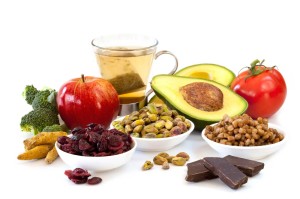 Back in the day when I used to get gout attacks and I was only starting to figure out a good gout diet, I had heard the word “antioxidant” but I really had no idea what it meant. Sounded like some “woo-woo” thing. But, in December of 2008 my wife started buying some antioxidant-rich chocolate and I started eating it. In fact, she bought a lot of it, and I ate a LOT of it! At the time we were living in Dillon, Colorado — at an elevation over 9000 ft. – and every morning I would wake up with such stiff joints that I needed a hot shower just to get moving. My body felt old, and I just accepted it since I had just entered my 50’s.
Back in the day when I used to get gout attacks and I was only starting to figure out a good gout diet, I had heard the word “antioxidant” but I really had no idea what it meant. Sounded like some “woo-woo” thing. But, in December of 2008 my wife started buying some antioxidant-rich chocolate and I started eating it. In fact, she bought a lot of it, and I ate a LOT of it! At the time we were living in Dillon, Colorado — at an elevation over 9000 ft. – and every morning I would wake up with such stiff joints that I needed a hot shower just to get moving. My body felt old, and I just accepted it since I had just entered my 50’s.
However, about a week after I essentially started living on chocolate, I noticed one morning that I didn’t feel the need for a wake-up shower…I hopped out of bed ready to go. Then after about 3 months on this antioxidant-rich food, I suddenly realized, “Hey, I haven’t had a gout attack in months!” I didn’t want to tell my wife, for fear that I would jinx it. So I just waited and watched…and I saw months and then years go by without another gout attack.
Because I had this very real, tangible experience as a result of eating antioxidant-rich foods, before I had any clue at all about what that even meant, I became curious. I started researching and learning about what antioxidants are, and how the body works at the cellular level…and I was amazed that I had lived to the ripe old age of 50 without eating more of them! Now I chow down daily on a variety of antioxidant-rich foods, and I am a bonafide “antioxidant-rich food freak”…I can’t get enough of them and I feel younger every day.
As for my gout, well, there just no other way to put it: I couldn’t have killed gout without antioxidants. Here’s more about these very special molecules.
What Are Antioxidants, Anyway?
The word gets thrown around a lot, but at its most basic, antioxidants work at the cellular level to prevent and repair oxidation from free radical damage. Free radical damage is a natural and unavoidable part of life, and is primarily what makes us age. It is akin to our bodies rusting from the inside out…throughout all the tissues and organs.
What you need to remember: our bodies are made up of cells, cells are made up of molecules, molecules are made up of atoms, and atoms are made up of protons and electrons. Oxidative damage is when one of those atoms loses an electron.
Antioxidants? They have an extra electron to give, making it possible for them to “cancel out” or reverse this free radical damage.
. . .
I love the blogs and am trying to follow the diet as much as possible. I don’t have time in the day for exercise until the weekends, but so far since reading your blogs, I have not had a reoccurring attack. Keep up the good work and thank you for sharing the information. ~ Dan
. . .
Antioxidants and Gout
Free radical damage is a normal part of aging – in fact, it’s a large part of why we age! We even seem built to handle a certain amount of oxidation, which is why some of us can “age gracefully.”
However, when oxidation is allowed to accelerate, watch out! Excess free radical damage can do a real number on your body at a very deep level because, among other things, it can hurt your cells’ ability to release acidic waste products for normal excretion. This can lead to inflammation, and a lowering of the body’s pH to acidic, which can cause even more problems. And because – you guessed it – some of these waste products are composed of uric acid that’s not getting excreted as it should be, free radical damage can also lead to gout.
At the root of accelerated oxidation? It can be many things: stress, poor air quality and pollution, smoking, and toxic chemicals in our environment like pesticides, antibiotics, fuels, preservatives, solvents, and other poisons. To cut down on free radical damage, it is extremely important to rid from your life as many of these electron-stealing demons as possible.
What else is important? Giving your body a stable source of extra electrons by eating as many antioxidant-rich foods as possible.
An Antioxidant Rich Diet Is The Answer
The best sources for obtaining antioxidants are in foods…whole, real, nutrient-dense foods. According to a study in the American Journal of Clinical Nutrition, the top 15 foods with the highest levels of antioxidants per serving are:
|
Antioxidant content |
|
| Food source |
mmol/serving |
| Blackberries | 5.746 |
| Walnuts | 3.721 |
| Strawberries | 3.584 |
| Artichokes, prepared | 3.559 |
| Cranberries | 3.125 |
| Coffee | 2.959 |
| Raspberries | 2.870 |
| Pecans | 2.741 |
| Blueberries | 2.680 |
| Cloves, ground | 2.637 |
| Grape juice | 2.557 |
| Chocolate | 2.516 |
| Cranberry juice | 2.474 |
| Cherries | 2.205 |
| Wine, red | 2.199 |
The full list of top 50 antioxidant-rich foods can be found here: https://ajcn.Nutrition.org
When it comes to picking and choosing antioxidant-rich foods to include in your gout diet, remember that all foods affect gout in different ways. Some of the foods that make this list, like cherries, include other biochemical substances that make them superheroes in the war on gout. Though cherries rank #14 here, in a gout killing diet, they should be at the top of your list for foods to include. The same goes for raw dark chocolate and berries.
Antioxidants & Water
It won’t make any list since it’s not technically a food (it has no calories), but water can be an antioxidant powerhouse that you don’t want to pass up. However, it must be the right kind of water! And by this, I mean ionized alkaline water that comes with BILLIONS of extra electrons to start sopping up all that damage from free radicals. Drinking ionized water also helps you stay hydrated, which is another key to reducing and preventing gout flare ups.
Antioxidants & Acid/Alkaline Balance
Another beautiful thing about antioxidant-rich foods to create an antioxidant rich diet is that not only are they helping to protect and heal your body, and making it easier for you to resume normal excretion of uric acid, but many antioxidant-rich foods are also alkalizing foods, meaning they prevent excess uric acid from building up in the first place.
Killing gout is a multi-pronged effort. We want to get rid of the excess uric acid right now that’s causing you such misery. Then, we want to keep it gone by increasing the body’s pH, thus preventing it from becoming overly acidic again. To keep the body in acid/alkaline balance, research tells us that the human body needs a diet composed of 20% Acidic and 80% Alkaline foods.
The kicker is that the common diet of most people is basically reversed, meaning that most people live with an overly acidic body condition. These folks are missing out on antioxidant-rich alkaline foods. And guess what else? Some acid-forming foods actually increase oxidative damage in the body! The worst offenders for this are processed junk that gets passed off as food, including hydrogenated fats and high fructose corn syrup. Steer clear! For more on the importance of alkaline foods, see my article on Food & Gout.
Antioxidants: From Gout to a Good Life
Antioxidants improved my health in a general way, which lead to my approach of getting over gout by overall health improvement. In particular, antioxidants help our immune system to function optimally. Because gout is essentially an autoimmune disease of the rheumatologic nature, we should be doing anything and everything we can to strengthen our immune system.
From my coursework at the Nutritional Therapy Association, I have learned that when we eat a nutrient-dense whole-food diet, accompanied by certain nutritional supplements and lots of water consumption…our health problems naturally start to disappear, and the immune system is restored to its optimal functionality. Rather than focusing on the how to treat gout attacks, we focus on how to improve our overall health…and watch the gout attacks naturally disappear. This is truly the holistic approach, in contrast to the reductionist approach of pharmaceuticals.
☆ Bottom-line: Eating antioxidant-rich foods help you kill your gout – and can save your life!
++ References: Gout and Antioxidants
Barazesh, Solmaz. Probing Question: How do antioxidants work? https://news.psu.edu/story/141171/2008/08/18/research/probing-question-how-do-antioxidants-work
Lee SJ, Terkeltaub RA, Kavanaugh A. Recent developments in diet and gout. Curr Opin Rheumatol. 2006;18(2):193-8. https://www.ncbi.nlm.nih.gov/pubmed/16462528
van Vugt RM, Rijken PJ, Rietveld AG, van Vugt AC, Dijkmans BA., Antioxidant intervention in rheumatoid arthritis: results of an open pilot study. Clin Rheumatol. 2008 Jun;27(6):771-5. doi: 10.1007/s10067-008-0848-6. Epub 2008 Feb 15. https://www.ncbi.nlm.nih.gov/pmc/articles/PMC2367388/
SHARE THE LOVE!
☆ ☆ ☆

